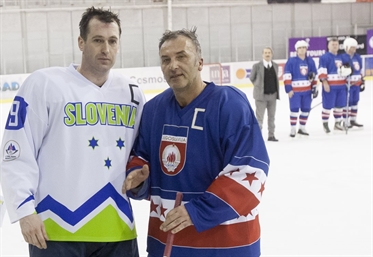A Slovenian send-off
A Slovenian send-off
Sochi-bound roster meets Olympic class of 1984

 Slovenian captain and flag bearer Tomaz Razingar meets with Mustafa Besic, the captain of Yugoslavia’s team in Sarajevo 1984, during a friendly game in Ljubljana. Photo: Urban Urbanc / Sportida.com
Slovenian captain and flag bearer Tomaz Razingar meets with Mustafa Besic, the captain of Yugoslavia’s team in Sarajevo 1984, during a friendly game in Ljubljana. Photo: Urban Urbanc / Sportida.com
If NHL super star Anze Kopitar might wonder what playing at the Olympics might have in store, his compatriot and three-time Olympian Gorazd Hiti can tell him about it.
And while CSKA Moscow's Jan Mursak hopes his goals can lead Slovenia to Olympic glory, Matjaz Sekelj knows the feeling, having netted twice in a 5-1 win for a Yugoslavia team celebrating three decades since playing at the 1984 Winter Olympics.
On 3rd February, two generations of underdogs faced off against each other during the “Day of Slovenian Hockey”. The main act during the event played at Ljubljana's Hala Tivoli saw an exhibition game take place between the current crop of Slovenian Olympians and players that represented Yugoslavia at their final appearance at an Olympic ice hockey tournament 30 years ago.
"The 1984 Olympics was a great experience for our generation of players," said Ljubljana-born Sekelj, who was 23 when he participated at his sole Olympics in Sarajevo 1984. "At that time international hockey had started to change, as a few national teams were getting more North Americans playing for them, while the Yugoslav team was only local guys and all Slovenians."
That Slovenia, part of Yugoslavia between 1918 and 1991, supplied the players for the Sarajevo 1984 roster came as little surprise. At that time two Slovenian clubs, Olimpija Ljubljana and Acroni Jesenice enjoyed a duopoly dating back to the mid-1950s for winning national Yugoslav championships.
The Slovenian dominance was also felt at national team level where a whopping 91 per cent of the players representing Yugoslavia during its existence were Slovenians, with Croats and Serbs almost equally supplying the rest.
Continue readingBut while Jure Franko was to cause an upset in 1984, winning Yugoslavia's first ever medal at the Winter Olympics with his giant slalom silver, the Yugoslav ice hockey team coached by Stefan Seme had an uphill struggle on their hands.
"Having qualified as hosts, the development of hockey as well as the economic climate had been going down in Yugoslavia which affected us," said Sekelj about the team's preparations ahead of the 1984 Olympics. "Although we met up during many training camps, we lacked competitive matches against international opponents."
Starting in 1964, Yugoslavia's national team participated in five Olympics before its break-up. Its best performance came in Grenoble 1968, finishing 9th out of 14 teams.
Ahead of Sarajevo, the team suffered a blow when 37-year-old veteran winger Rudi Hiti, who later was named to the IIHF Hall of Fame, was ruled out with an injury. Hiti, who clocked up 17 World Championships and two Olympics for Yugoslavia, had back in 1970 been invited to a training camp with the Chicago Blackhawks, which was cut short after breaking his jaw during his first exhibition game.
With Hiti’s absence, a heavy shift was expected from his younger brother Gorazd, who entered the 1984 Olympics as one of the team's leading players together with Mustafa Besic, Zvone Suvak and Edo Hafner.
But while four years earlier Al Michaels famously believed in miracles when commentating USA's epic 4-3 win over Soviet Union at the 1980 Lake Placid Olympics, any chances for upsets coming from the 1984 hosts were far-fetched.
Andrej Stare, who worked as a TV commentator at the Sarajevo Olympics, summed up the 1984 crop of players as "very good skaters, but tactically lagging behind while the goalkeepers were not of top-level."
As the snow was falling down from the skies in buckets and the 14th Olympic Winter Games not yet opened, the ice hockey tournament got underway on 7th February 1984. Barely had the crowd found their seats before they were up on their feet as Yugoslavia needed only 59 seconds in their opening game to go ahead against West Germany.
Besic, born in what today is Bosnia and Herzegovina, but who had moved to Jesenice at the age of two before carving out a long career in Italian ice hockey, was the scorer. Going into the first intermission with the game tied at one, Yugoslavia’s hopes for an upset were crushed as West Germany stepped up a gear and led by the towering presence of Erich Kühnhackl soon sailed away to record an emphatic 8-1 win.
Two days later Yugoslavia conceded eleven unanswered goals against reigning bronze medallists Sweden. Being goal-shy with a leaking defence was a concern, especially as a red hot Soviet Union team looking for revenge for losing out on the Olympic gold medals in Lake Placid four year earlier awaited next.
Ivan Scap, a veteran Yugoslavian blueliner, brought down the loudest cheer of the night as he pulled a goal back behind Vladislav Tretiak in a game that ended with a lopsided 9-1 defeat for the hosts.
Viktor Tikhonov's men were only to concede six goals in eight games as the Soviet Union steamrolled their way to the gold medals.
"To play against the KLM-line and Fetisov and Kasatonov was a memory of our lives," recalled Sekelj "We knew beforehand that the Soviet Union, Sweden and also probably West Germany were going to be too strong for us, but we hoped to win one game and we knew we had better chances against Italy and Poland who were closer to our level."
Italy, who had seen off Poland earlier in the tournament, entered the game against Yugoslavia in confident mood and soon took the lead. But this time the head of the hosts did not drop as they worked themselves into the game.
Although perhaps not a miracle, television commentator Stare remembered this match as a "small sensation". Dominik Lomovsek, the 171 cm veteran goalie from reigning Yugoslav champion Olimpija Ljubljana, enjoyed an inspired shift between the pipes and going forward it was to be a lasting memory for Sekelj as he scored two and added a helper in Yugoslavia’s resounding 5-1 victory.
"We went 110 per cent into that game," Sekelj said. "It was my best night for the national team and the memories from it make me proud. Now all of a sudden the best ever result for a Yugoslav team at the Olympics was a possibility."
But two days later, a winless Poland so far, took the high-flying Yugoslavs back to the ground with a bang with an 8-1 demolition.
"We were empty after all the tough games. To play so many tough games against big opponents in so few days was something we were not used to," said Sekelj as Yugoslavia finished eleventh with only Norway behind them.
The immediate effects of hosting the 1984 Olympics were positive for Yugoslav ice hockey. The game spread across the country as Slovenian players moved to clubs outside their home republic. Sekelj himself played at Crvena Zvezda Belgrade and then for Medvescak Zagreb before being forced to retire in 1988 bringing down the curtain on a playing career where he won five national titles, four with Olimpija and his final one with Medvescak.
Yugoslavia missed out on qualification for the 1988 Olympics in Calgary and soon after the country was breaking up. Slovenia was the first of the Yugoslav republics to become independent in June 1991 with the Slovenian national team playing its first match the following year.
Sekelj himself, who had moved into coaching following his retirement, was later to coach the Slovenian national team between 2000 and 2003. Following in his footsteps from the 1984 roster that were to coach Slovenian national teams were future U18 coach Andrej Vidmar, Gorazd Hiti of the U20 national team and Dragutin Mlinarec, who coached Slovenia's women's national team.
From 10 to 12 January, as part of the 30th anniversary of the 1984 Olympics, Olimpija Ljubljana travelled down to Sarajevo to play two EBEL league games in what today is the capital of Bosnia and Herzegovina. Sekelj had been one of the instigators behind bringing top-level hockey back to an Olympic city, which had suffered severe destruction during the civil war following the break-up of Yugoslavia in the early ‘90s.
"It made me really sad when I had been back to Sarajevo and seen the bobsleigh track and the ski jumps from the 1984 Olympics all being destroyed. Also to see what happened to the big Zetra ice rink, which had been completely destroyed in the war, made me decide to do something," said Sekelj, who in his current role as GM of Olimpija saw his team play against VSV Villach and Austrian record champion KAC Klagenfurt in front of bumper crowds at the reconstructed Zetra, now officially named Olympic Hall Juan Antonio Samaranch.
His most recent visit back to Sarajevo last month also rolled back the years for more a trip down memory lane as life of an Olympian during February 1984.
"While taking part at World Championships you were meeting only hockey players, but during the Olympics you could for instance go for lunch and meet stars and heroes from all different sports. I also remember how during the Sarajevo Olympics we were staying beside the block where the U.S. Olympians were housed. Bill Johnson, the U.S. downhill skier, had won a surprise gold medal and it was hard to sleep for the next two nights while his win was celebrated," said Sekelj.
On 13th February, Slovenia will play its first Olympic ice hockey game as an independent country in Sochi. Facing hosts Russia in a group that also includes Team USA and Slovakia, Sekelj is realistic about Slovenia's chances, but just as in 1984 harbouring hopes for an upset as the stage is set for new Olympic heroes to be born.
"To be part of the 12 best teams having only seven ice rinks and one professional team is amazing," he said.
"It's a higher level than 30 years ago, but the team is in a similar situation like we were," he added. "Realistically Russia and the USA are very strong but we have some chance in the game against Slovakia.
Back to Overview











































